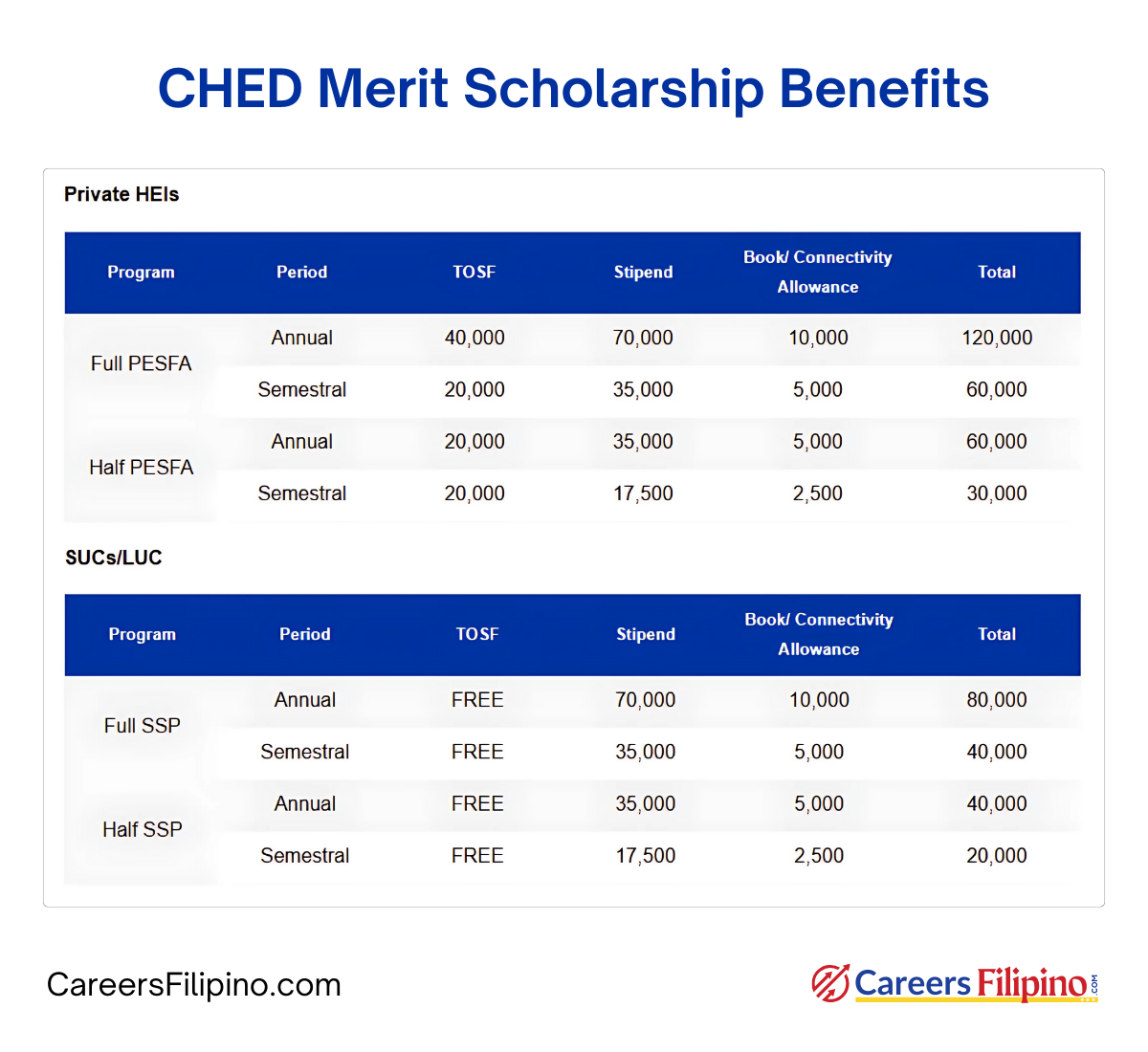CHED Scholarship 2025-2026 is Open | Apply NOW
CHED Scholarship 2025 program is now open to apply for all incoming first year college students in the Philippines. Recently, the Commission on Higher Education has announced the opening of Online application for CHED Merit Scholarship program for the school year 2025-2026.

Table of Contents
- CHED Scholarship
- Who can apply for Scholarship
- Benefits of CHED Scholarship
- Qualifications For Scholarship
- Documentary Requirements
- Number of Slots Open for Scholarship
- Priority Courses for CHED Scholarship
- Online Application Timeline
- How to Apply for CHED Scholarship
- Scholarship Video Guide
- Frequently Asked Questions (FAQs)
CHED Scholarship
The CHED Scholarship program is a government-funded scholarship program that is aimed at helping college students pursue their education by providing Financial Assistance as scholarship benefits.
This program supports academically talented students, especially those who belong to the following special groups:
- Underprivileged and homeless citizens (RA 7279);
- Persons with Disability (RA 7277); and
- Solo parents and/or their dependents (RA 8371).
The CHED scholarship is open for incoming freshmen who want to pursue their undergraduate studies in any CHED recognized priority programs in private higher education institutions (HEIs) or State Universities and Colleges (SUCs) and Local Universities and Colleges (LUCs).
The Commission on Higher Education is calling in applications from all eligible and interested candidates to apply for its scholarship program for the school year 2025-2026.
Who can apply for Scholarship
College students enrolled in State University (SUCs), Local Universities and Colleges (LUCs) and Private Higher Educational Institutions (PHEIs) are eligible to apply for this scholarship program.
Benefits of CHED Scholarship
Students who are qualified for CHED Scholarship program may be awarded a full or partial scholarship under the State Scholarship and Private Education Student Financial Assistance (PESFA).
The financial assistance will cover the following:
- Tuition and Other School Fees
- Monthly Stipend for living expenses
- Book / Connectivity Allowance

Private Higher Educational Institutions
CHED Scholars who prefer to enroll in Private Higher Educational Institutions (PHEIs) will receive the following benefits:
FULL PESFA
Annual Benefits – ₱120,000
Students qualified for FULL PESFA will receive a total of ₱120,000 as annual benefits, which are as follows:
- Tuition and Other School Fees – ₱40,000
- Stipend for living expenses – ₱70,000
- Book / Connectivity Allowance – ₱10,000
Semestral Benefits – ₱60,000
Students qualified for FULL PESFA will receive a total of ₱60,000 as semestral benefits, which are as follows:
- Tuition and Other School Fees – ₱20,000
- Stipend for living expenses – ₱35,000
- Book / Connectivity Allowance – ₱5,000
HALF PESFA
Annual Benefits – ₱60,000
Students qualified for HALF PESFA will receive a total of ₱60,000 as annual benefits, which are as follows:
- Tuition and Other School Fees – ₱20,000
- Stipend for living expenses – ₱35,000
- Book / Connectivity Allowance – ₱5,000
Semestral Benefits – ₱60,000
Students qualified for HALF PESFA will receive a total of ₱30,000 as semestral benefits, which are as follows:
- Tuition and Other School Fees – ₱10,000
- Stipend for living expenses – ₱17,500
- Book / Connectivity Allowance – ₱2,500
State / Local Universities and Colleges
CHED Scholars who prefer to enroll in state university, local university and college will receive the following benefits:
FULL SSP
Annual Benefits – ₱80,000
Students qualified for FULL SSP will a total of ₱80,000 as annual benefits, which are as follows:
- Tuition and Other School Fees – FREE
- Stipend for living expenses – ₱70,000
- Book / Connectivity Allowance – ₱10,000
Semestral Benefits – ₱80,000
Students qualified for FULL SSP will a total of ₱40,000 as semestral benefits, which are as follows:
- Tuition and Other School Fees – FREE
- Stipend for living expenses – ₱35,000
- Book / Connectivity Allowance – ₱5,000
HALF SSP
Annual Benefits – ₱80,000
Students qualified for HALF SSP will a total of ₱40,000 as annual benefits, which are as follows:
- Tuition and Other School Fees – FREE
- Stipend for living expenses – ₱35,000
- Book / Connectivity Allowance – ₱5,000
Semestral Benefits – ₱80,000
Students qualified for HALF SSP will a total of ₱20,000 as semestral benefits, which are as follows:
- Tuition and Other School Fees – FREE
- Stipend for living expenses – ₱17,500
- Book / Connectivity Allowance – ₱2,500
READ: Ongoing College Scholarships 2025-2026 Open to Apply
Qualifications For Scholarship
The list of qualifications required to be eligible to apply for scholarship is as follows:
- Applicant must be a Filipino citizen
- Must be a Graduating high school student/ High school graduate
- He or She must have a general weighted average (GWA) of at least 96% for Full Merit Program and 93% to 95% or its equivalent for Half Merit Program
- Student-applicants belonging to the special group of persons such as the underprivileged and Homeless Citizens under Republic Act (RA) No. 7279, Persons with Disability (PWDs) under RA No. 7277 as amended, Solo Parents and/or their Dependents under RA 8371, shall submit certifications and/or Identification Cards (IDs) issued by the appropriate offices or agencies.
- Avail of only one government-funded financial assistance program.
READ: Panasonic College Scholarship 2025-2026 is Open to Apply
Documentary Requirements
The list of documents required while applying for the scholarship is as follows:
- Citizenship:
- Certified true copy of Birth Certificate
- Academic:
- High school report card for incoming freshmen students eligible for college; and
- Duly certified true copy of grades for Grade 11 and 1st semester of Grade 12 for graduating high school students
- Income: (whichever is applicable)
- Latest Income Tax Return (ITR) of parents or guardian;
- Certificate of Tax Exemption from the Bureau of Internal Revenue (BIR);
- Certificate of Indigence either from their Barangay or Department of Social Welfare and Development (DSWD);
- Case Study report from DSWD; and
- Latest copy of contract or proof of income, for the children of Overseas Filipino Workers and seafarers
- Additional Requirements
- Identification Card (ID) – Special Group (Underprivileged or Homeless, PWD, Solo Parent, Senior Citizen, Indigenous People)
Number of Slots Open for Scholarship
A total of 2,779 slots are available for CHED Scholarship program.
Priority Courses for CHED Scholarship
College Students who enroll in the priority courses recognized by CHED are eligible to apply for the CHED Scholarship program.
Checkout the post given below for complete list of CHED priority courses:
Online Application Timeline
- The Online application for CHED Merit Scholarship opened on May 5, 2025.
- The deadline date to apply for CHED Scholarship 2025-2026 is June 20, 2025.
How to Apply for CHED Scholarship
All interested and eligible candidates can apply for CHED Scholarship program by visiting the Region wise Online Scholarship Application Portals.
Application Procedure
- Prepare the complete documentary requirements
- Scan the documentary requirements clearly.
- Send the application and documents ONLINE to your respective CHED Regional Office.
CHED Regional Portals and Application Links
To get latest CHED scholarship updates, Join CHED Scholarships Facebook Broadcast channel.
Scholarship Video Guide
Frequently Asked Questions (FAQs)
The CHED Merit Scholarships is a program created to help deserving Filipino students in pursuing a college degree.
The CHED Merit Scholarship is available to Filipino citizens who are currently enrolled or about to enroll in an undergraduate or graduate degree at any CHED-recognized institution.
If you are a full-time student, you can receive up to Php120,000 per semester. They will receive Php60,000 per semester as a half-scholar.
Note: Our articles are solely for informational purposes. We are not affiliated to the entities featured. The source/s are provided at the bottom of each article so that you can double-check the authenticity of the articles.
[Reference – CHED]







